#DevOps Enhances Security
Explore tagged Tumblr posts
Text
DevSecOps Explained: DevOps + Security Benefits
Learn how DevSecOps merges security into DevOps workflows to build secure, high-quality applications from the start.
0 notes
Text
Seamless Transition and Enhanced Support: TekLink’s Success Story

In the dynamic world of technology, businesses constantly seek ways to optimize their operations and enhance efficiency. One critical aspect is the seamless transition of IT responsibilities, ensuring uninterrupted support and continued improvements. In a recent collaboration, the TekLink Team successfully replaced an onsite Architect with an offshore resource for a client, offering robust support and enhancements. This blog delves into the structured process employed by the TekLink Team, highlighting the critical services provided and the substantial benefits achieved.
The Transition Process:
Knowledge Transition:
The foundation of any successful transition lies in the effective transfer of knowledge. The TekLink Team meticulously prepared Knowledge Transition topics and content from the onsite resource, ensuring the offshore resource was well-equipped to take on the responsibilities seamlessly.
Advisory Role for Azure Services:
TekLink didn’t just replace roles; they elevated them. The team provided an advisory role for supporting and fine-tuning Azure services, showcasing their expertise in cloud solutions and commitment to optimizing the client’s infrastructure.
Comprehensive Azure Platform Services:
Offering more than just basic support, TekLink provided Architecture, Administration, and Trouble-shooting services for the Azure platform. This comprehensive approach ensured that every aspect of the client’s cloud environment was meticulously managed.
End-User Support and Landscape Enhancement:
Beyond technical aspects, the TekLink Team extended their support to end-user requests and the enhancement of the existing landscape. This client-centric approach showcased their commitment to meeting business needs and user satisfaction.
Azure Platform Security Administration:
Recognizing the paramount importance of security in the digital landscape, TekLink took charge of Azure Platform Security Administration, aligning IT security processes with the business’s specific needs.
On-Premise System Administration:
TekLink didn’t limit its expertise to the cloud; it also provided Server Administration for on-premises systems. This included patching, upgrades, reporting/analytics, and gateway services, ensuring a holistic approach to IT management.
Optimizing Outage Window:
A crucial aspect of server administration is minimizing downtime. TekLink provided solutions for patching servers, optimizing outage windows, and ensuring the client’s operations ran smoothly without significant disruptions.
SoX Policies for BI Applications:
Compliance is key in today’s regulatory environment. TekLink implemented and supported Sarbanes-Oxley (SoX) policies for BI applications, ensuring that the client’s business intelligence processes adhered to industry standards.
24x7x365 On-Call Support:
Recognizing the importance of continuous support, TekLink offered round-the-clock on-call support, providing the client with peace of mind and immediate assistance whenever needed.
Monitoring and Support for Application and DevOps Teams:
Utilizing advanced tools, TekLink performed monitoring, optimization, and troubleshooting for both the Application and DevOps teams. This proactive approach ensured potential issues were identified and resolved before they could impact operations.
The Benefits:
The TekLink Team’s comprehensive approach to the client’s needs resulted in a range of substantial benefits:
Aligned IT Security Processes:
The transition aligned IT security processes with the client’s specific business needs, ensuring a robust and customized security framework.
Role-Based Application Security:
TekLink implemented role-based application security for both SAP and cloud applications, enhancing the overall security posture of the client’s digital landscape.
Corporate Audit Requirements:
The application security measures implemented were in accordance with corporate audit requirements, demonstrating TekLink’s commitment to compliance and accountability.
Conclusion:
The TekLink Team’s successful transition and ongoing support for the client exemplify their commitment to excellence and client satisfaction. By providing a comprehensive set of services and aligning IT processes with business needs, TekLink has met the client’s expectations and set a benchmark for seamless IT transitions in the industry. This case study is a testament to the importance of strategic planning, expertise, and a client-centric approach in ensuring the success of IT initiatives. For more information, visit https://teklink.com/knowledge-center/seamless-transition-and-enhanced-support-teklinks-success-story/
0 notes
Text
How Python Powers Scalable and Cost-Effective Cloud Solutions

Explore the role of Python in developing scalable and cost-effective cloud solutions. This guide covers Python's advantages in cloud computing, addresses potential challenges, and highlights real-world applications, providing insights into leveraging Python for efficient cloud development.
Introduction
In today's rapidly evolving digital landscape, businesses are increasingly leveraging cloud computing to enhance scalability, optimize costs, and drive innovation. Among the myriad of programming languages available, Python has emerged as a preferred choice for developing robust cloud solutions. Its simplicity, versatility, and extensive library support make it an ideal candidate for cloud-based applications.
In this comprehensive guide, we will delve into how Python empowers scalable and cost-effective cloud solutions, explore its advantages, address potential challenges, and highlight real-world applications.
Why Python is the Preferred Choice for Cloud Computing?
Python's popularity in cloud computing is driven by several factors, making it the preferred language for developing and managing cloud solutions. Here are some key reasons why Python stands out:
Simplicity and Readability: Python's clean and straightforward syntax allows developers to write and maintain code efficiently, reducing development time and costs.
Extensive Library Support: Python offers a rich set of libraries and frameworks like Django, Flask, and FastAPI for building cloud applications.
Seamless Integration with Cloud Services: Python is well-supported across major cloud platforms like AWS, Azure, and Google Cloud.
Automation and DevOps Friendly: Python supports infrastructure automation with tools like Ansible, Terraform, and Boto3.
Strong Community and Enterprise Adoption: Python has a massive global community that continuously improves and innovates cloud-related solutions.
How Python Enables Scalable Cloud Solutions?
Scalability is a critical factor in cloud computing, and Python provides multiple ways to achieve it:
1. Automation of Cloud Infrastructure
Python's compatibility with cloud service provider SDKs, such as AWS Boto3, Azure SDK for Python, and Google Cloud Client Library, enables developers to automate the provisioning and management of cloud resources efficiently.
2. Containerization and Orchestration
Python integrates seamlessly with Docker and Kubernetes, enabling businesses to deploy scalable containerized applications efficiently.
3. Cloud-Native Development
Frameworks like Flask, Django, and FastAPI support microservices architecture, allowing businesses to develop lightweight, scalable cloud applications.
4. Serverless Computing
Python's support for serverless platforms, including AWS Lambda, Azure Functions, and Google Cloud Functions, allows developers to build applications that automatically scale in response to demand, optimizing resource utilization and cost.
5. AI and Big Data Scalability
Python’s dominance in AI and data science makes it an ideal choice for cloud-based AI/ML services like AWS SageMaker, Google AI, and Azure Machine Learning.
Looking for expert Python developers to build scalable cloud solutions? Hire Python Developers now!
Advantages of Using Python for Cloud Computing
Cost Efficiency: Python’s compatibility with serverless computing and auto-scaling strategies minimizes cloud costs.
Faster Development: Python’s simplicity accelerates cloud application development, reducing time-to-market.
Cross-Platform Compatibility: Python runs seamlessly across different cloud platforms.
Security and Reliability: Python-based security tools help in encryption, authentication, and cloud monitoring.
Strong Community Support: Python developers worldwide contribute to continuous improvements, making it future-proof.
Challenges and Considerations
While Python offers many benefits, there are some challenges to consider:
Performance Limitations: Python is an interpreted language, which may not be as fast as compiled languages like Java or C++.
Memory Consumption: Python applications might require optimization to handle large-scale cloud workloads efficiently.
Learning Curve for Beginners: Though Python is simple, mastering cloud-specific frameworks requires time and expertise.
Python Libraries and Tools for Cloud Computing
Python’s ecosystem includes powerful libraries and tools tailored for cloud computing, such as:
Boto3: AWS SDK for Python, used for cloud automation.
Google Cloud Client Library: Helps interact with Google Cloud services.
Azure SDK for Python: Enables seamless integration with Microsoft Azure.
Apache Libcloud: Provides a unified interface for multiple cloud providers.
PyCaret: Simplifies machine learning deployment in cloud environments.
Real-World Applications of Python in Cloud Computing
1. Netflix - Scalable Streaming with Python
Netflix extensively uses Python for automation, data analysis, and managing cloud infrastructure, enabling seamless content delivery to millions of users.
2. Spotify - Cloud-Based Music Streaming
Spotify leverages Python for big data processing, recommendation algorithms, and cloud automation, ensuring high availability and scalability.
3. Reddit - Handling Massive Traffic
Reddit uses Python and AWS cloud solutions to manage heavy traffic while optimizing server costs efficiently.
Future of Python in Cloud Computing
The future of Python in cloud computing looks promising with emerging trends such as:
AI-Driven Cloud Automation: Python-powered AI and machine learning will drive intelligent cloud automation.
Edge Computing: Python will play a crucial role in processing data at the edge for IoT and real-time applications.
Hybrid and Multi-Cloud Strategies: Python’s flexibility will enable seamless integration across multiple cloud platforms.
Increased Adoption of Serverless Computing: More enterprises will adopt Python for cost-effective serverless applications.
Conclusion
Python's simplicity, versatility, and robust ecosystem make it a powerful tool for developing scalable and cost-effective cloud solutions. By leveraging Python's capabilities, businesses can enhance their cloud applications' performance, flexibility, and efficiency.
Ready to harness the power of Python for your cloud solutions? Explore our Python Development Services to discover how we can assist you in building scalable and efficient cloud applications.
FAQs
1. Why is Python used in cloud computing?
Python is widely used in cloud computing due to its simplicity, extensive libraries, and seamless integration with cloud platforms like AWS, Google Cloud, and Azure.
2. Is Python good for serverless computing?
Yes! Python works efficiently in serverless environments like AWS Lambda, Azure Functions, and Google Cloud Functions, making it an ideal choice for cost-effective, auto-scaling applications.
3. Which companies use Python for cloud solutions?
Major companies like Netflix, Spotify, Dropbox, and Reddit use Python for cloud automation, AI, and scalable infrastructure management.
4. How does Python help with cloud security?
Python offers robust security libraries like PyCryptodome and OpenSSL, enabling encryption, authentication, and cloud monitoring for secure cloud applications.
5. Can Python handle big data in the cloud?
Yes! Python supports big data processing with tools like Apache Spark, Pandas, and NumPy, making it suitable for data-driven cloud applications.
#Python development company#Python in Cloud Computing#Hire Python Developers#Python for Multi-Cloud Environments
2 notes
·
View notes
Text
Top Hosting Providers in Delhi
Launching your dream website only to face constant crashes and slow loading times can be a nightmare for any business or individual aiming to thrive online. Choosing the right hosting provider can make or break your online journey. In Delhi’s competitive market, finding a dependable solution can be overwhelming. This article explores the top hosting providers in Delhi to ensure success for your digital presence.
Key Features of a Reliable Hosting Provider
1. High Uptime Guarantee
A reliable hosting provider ensures your website is accessible 24/7, minimizing interruptions and maximizing productivity.
2. Affordable Plans for All Budgets
From startups to established businesses, flexible plans with transparent pricing ensure premium services are accessible to everyone.
3. Blazing-Fast Speeds
Website speed is critical for user engagement and SEO. Optimized server performance ensures lightning-fast loading times that enhance the user experience.
4. Robust Security Measures
With threats like cyberattacks on the rise, hosting providers offer SSL certificates, DDoS protection, and regular backups to safeguard your data.
5. Outstanding Customer Support
Technical issues can be stressful, but 24/7 support teams ensure quick resolutions and peace of mind.
Top Hosting Providers in Delhi
1. Hostagle
Hostagle combines affordability, reliability, and robust features to deliver exceptional hosting services. Whether you need shared hosting, dedicated servers, or domain registration, Hostagle is a trusted partner for businesses in Delhi. With 24/7 customer support and scalable plans, Hostagle ensures your website’s success.
2. Penguin Technology
Penguin Technology specializes in Cloud, Linux, and DevOps solutions, offering end-to-end IT infrastructure management. Their expertise ensures that businesses have professional hands managing their hosting, both in-house and on the cloud.
3. Webkype
Webkype is a preferred technology partner for startups and enterprises, providing comprehensive solutions like ERP, CRM, web development, and IT services. They empower businesses to thrive in the digital era with reliable hosting and IT support.
4. Softzenia
Softzenia is a team of experienced professionals delivering services such as web design, e-commerce development, payment gateway integration, and online marketing. Their hosting solutions complement their full suite of web services, making them a one-stop shop for businesses.
5. D2Web Solution Ltd.
D2Web Solution Ltd. offers domain and server solutions, including website hosting, VPS servers, cloud hosting, and digital marketing services. Their versatile offerings make them a go-to choice for businesses in Delhi.
Choosing the best hosting provider is vital for your website’s success. With options like Hostagle, Penguin Technology, Webkype, Softzenia, and D2Web Solution Ltd., businesses in Delhi have access to reliable, affordable, and secure hosting solutions. Evaluate your needs and partner with a provider that aligns with your goals for a seamless digital experience.
FAQs
Q1: What makes Hostagle different from other hosting providers? A: Hostagle offers a unique combination of affordability, reliability, and robust features tailored to diverse needs.
Q2: Which hosting provider is best for startups in Delhi? A: Hostagle and Webkype offer affordable plans and scalable solutions, making them ideal for startups.
Q3: Do these providers offer 24/7 customer support? A: Yes, providers like Hostagle and Softzenia offer round-the-clock support to assist with technical issues.
Q4: Can I get cloud hosting services in Delhi? A: Yes, Penguin Technology and D2Web Solution Ltd. specialize in cloud hosting solutions.
#web hosting#hosting service provider#hosting services#cloud hosting provider#webhosting#vps hosting#Domain and Hosting
2 notes
·
View notes
Text
Top 10 In- Demand Tech Jobs in 2025

Technology is growing faster than ever, and so is the need for skilled professionals in the field. From artificial intelligence to cloud computing, businesses are looking for experts who can keep up with the latest advancements. These tech jobs not only pay well but also offer great career growth and exciting challenges.
In this blog, we’ll look at the top 10 tech jobs that are in high demand today. Whether you’re starting your career or thinking of learning new skills, these jobs can help you plan a bright future in the tech world.
1. AI and Machine Learning Specialists
Artificial Intelligence (AI) and Machine Learning are changing the game by helping machines learn and improve on their own without needing step-by-step instructions. They’re being used in many areas, like chatbots, spotting fraud, and predicting trends.
Key Skills: Python, TensorFlow, PyTorch, data analysis, deep learning, and natural language processing (NLP).
Industries Hiring: Healthcare, finance, retail, and manufacturing.
Career Tip: Keep up with AI and machine learning by working on projects and getting an AI certification. Joining AI hackathons helps you learn and meet others in the field.
2. Data Scientists
Data scientists work with large sets of data to find patterns, trends, and useful insights that help businesses make smart decisions. They play a key role in everything from personalized marketing to predicting health outcomes.
Key Skills: Data visualization, statistical analysis, R, Python, SQL, and data mining.
Industries Hiring: E-commerce, telecommunications, and pharmaceuticals.
Career Tip: Work with real-world data and build a strong portfolio to showcase your skills. Earning certifications in data science tools can help you stand out.
3. Cloud Computing Engineers: These professionals create and manage cloud systems that allow businesses to store data and run apps without needing physical servers, making operations more efficient.
Key Skills: AWS, Azure, Google Cloud Platform (GCP), DevOps, and containerization (Docker, Kubernetes).
Industries Hiring: IT services, startups, and enterprises undergoing digital transformation.
Career Tip: Get certified in cloud platforms like AWS (e.g., AWS Certified Solutions Architect).
4. Cybersecurity Experts
Cybersecurity professionals protect companies from data breaches, malware, and other online threats. As remote work grows, keeping digital information safe is more crucial than ever.
Key Skills: Ethical hacking, penetration testing, risk management, and cybersecurity tools.
Industries Hiring: Banking, IT, and government agencies.
Career Tip: Stay updated on new cybersecurity threats and trends. Certifications like CEH (Certified Ethical Hacker) or CISSP (Certified Information Systems Security Professional) can help you advance in your career.
5. Full-Stack Developers
Full-stack developers are skilled programmers who can work on both the front-end (what users see) and the back-end (server and database) of web applications.
Key Skills: JavaScript, React, Node.js, HTML/CSS, and APIs.
Industries Hiring: Tech startups, e-commerce, and digital media.
Career Tip: Create a strong GitHub profile with projects that highlight your full-stack skills. Learn popular frameworks like React Native to expand into mobile app development.
6. DevOps Engineers
DevOps engineers help make software faster and more reliable by connecting development and operations teams. They streamline the process for quicker deployments.
Key Skills: CI/CD pipelines, automation tools, scripting, and system administration.
Industries Hiring: SaaS companies, cloud service providers, and enterprise IT.
Career Tip: Earn key tools like Jenkins, Ansible, and Kubernetes, and develop scripting skills in languages like Bash or Python. Earning a DevOps certification is a plus and can enhance your expertise in the field.
7. Blockchain Developers
They build secure, transparent, and unchangeable systems. Blockchain is not just for cryptocurrencies; it’s also used in tracking supply chains, managing healthcare records, and even in voting systems.
Key Skills: Solidity, Ethereum, smart contracts, cryptography, and DApp development.
Industries Hiring: Fintech, logistics, and healthcare.
Career Tip: Create and share your own blockchain projects to show your skills. Joining blockchain communities can help you learn more and connect with others in the field.
8. Robotics Engineers
Robotics engineers design, build, and program robots to do tasks faster or safer than humans. Their work is especially important in industries like manufacturing and healthcare.
Key Skills: Programming (C++, Python), robotics process automation (RPA), and mechanical engineering.
Industries Hiring: Automotive, healthcare, and logistics.
Career Tip: Stay updated on new trends like self-driving cars and AI in robotics.
9. Internet of Things (IoT) Specialists
IoT specialists work on systems that connect devices to the internet, allowing them to communicate and be controlled easily. This is crucial for creating smart cities, homes, and industries.
Key Skills: Embedded systems, wireless communication protocols, data analytics, and IoT platforms.
Industries Hiring: Consumer electronics, automotive, and smart city projects.
Career Tip: Create IoT prototypes and learn to use platforms like AWS IoT or Microsoft Azure IoT. Stay updated on 5G technology and edge computing trends.
10. Product Managers
Product managers oversee the development of products, from idea to launch, making sure they are both technically possible and meet market demands. They connect technical teams with business stakeholders.
Key Skills: Agile methodologies, market research, UX design, and project management.
Industries Hiring: Software development, e-commerce, and SaaS companies.
Career Tip: Work on improving your communication and leadership skills. Getting certifications like PMP (Project Management Professional) or CSPO (Certified Scrum Product Owner) can help you advance.
Importance of Upskilling in the Tech Industry
Stay Up-to-Date: Technology changes fast, and learning new skills helps you keep up with the latest trends and tools.
Grow in Your Career: By learning new skills, you open doors to better job opportunities and promotions.
Earn a Higher Salary: The more skills you have, the more valuable you are to employers, which can lead to higher-paying jobs.
Feel More Confident: Learning new things makes you feel more prepared and ready to take on tougher tasks.
Adapt to Changes: Technology keeps evolving, and upskilling helps you stay flexible and ready for any new changes in the industry.
Top Companies Hiring for These Roles
Global Tech Giants: Google, Microsoft, Amazon, and IBM.
Startups: Fintech, health tech, and AI-based startups are often at the forefront of innovation.
Consulting Firms: Companies like Accenture, Deloitte, and PwC increasingly seek tech talent.
In conclusion, the tech world is constantly changing, and staying updated is key to having a successful career. In 2025, jobs in fields like AI, cybersecurity, data science, and software development will be in high demand. By learning the right skills and keeping up with new trends, you can prepare yourself for these exciting roles. Whether you're just starting or looking to improve your skills, the tech industry offers many opportunities for growth and success.
#Top 10 Tech Jobs in 2025#In- Demand Tech Jobs#High paying Tech Jobs#artificial intelligence#datascience#cybersecurity
2 notes
·
View notes
Text
What are the latest trends in the IT job market?

Introduction
The IT job market is changing quickly. This change is because of new technology, different employer needs, and more remote work.
For jobseekers, understanding these trends is crucial to positioning themselves as strong candidates in a highly competitive landscape.
This blog looks at the current IT job market. It offers insights into job trends and opportunities. You will also find practical strategies to improve your chances of getting your desired role.
Whether you’re in the midst of a job search or considering a career change, this guide will help you navigate the complexities of the job hunting process and secure employment in today’s market.
Section 1: Understanding the Current IT Job Market
Recent Trends in the IT Job Market
The IT sector is booming, with consistent demand for skilled professionals in various domains such as cybersecurity, cloud computing, and data science.
The COVID-19 pandemic accelerated the shift to remote work, further expanding the demand for IT roles that support this transformation.
Employers are increasingly looking for candidates with expertise in AI, machine learning, and DevOps as these technologies drive business innovation.
According to industry reports, job opportunities in IT will continue to grow, with the most substantial demand focused on software development, data analysis, and cloud architecture.
It’s essential for jobseekers to stay updated on these trends to remain competitive and tailor their skills to current market needs.
Recruitment efforts have also become more digitized, with many companies adopting virtual hiring processes and online job fairs.
This creates both challenges and opportunities for job seekers to showcase their talents and secure interviews through online platforms.
NOTE: Visit Now
Remote Work and IT
The surge in remote work opportunities has transformed the job market. Many IT companies now offer fully remote or hybrid roles, which appeal to professionals seeking greater flexibility.
While remote work has increased access to job opportunities, it has also intensified competition, as companies can now hire from a global talent pool.
Section 2: Choosing the Right Keywords for Your IT Resume
Keyword Optimization: Why It Matters
With more employers using Applicant Tracking Systems (ATS) to screen resumes, it’s essential for jobseekers to optimize their resumes with relevant keywords.
These systems scan resumes for specific words related to the job description and only advance the most relevant applications.
To increase the chances of your resume making it through the initial screening, jobseekers must identify and incorporate the right keywords into their resumes.
When searching for jobs in IT, it’s important to tailor your resume for specific job titles and responsibilities. Keywords like “software engineer,” “cloud computing,” “data security,” and “DevOps” can make a huge difference.
By strategically using keywords that reflect your skills, experience, and the job requirements, you enhance your resume’s visibility to hiring managers and recruitment software.
Step-by-Step Keyword Selection Process
Analyze Job Descriptions: Look at several job postings for roles you’re interested in and identify recurring terms.
Incorporate Specific Terms: Include technical terms related to your field (e.g., Python, Kubernetes, cloud infrastructure).
Use Action Verbs: Keywords like “developed,” “designed,” or “implemented” help demonstrate your experience in a tangible way.
Test Your Resume: Use online tools to see how well your resume aligns with specific job postings and make adjustments as necessary.
Section 3: Customizing Your Resume for Each Job Application
Why Customization is Key
One size does not fit all when it comes to resumes, especially in the IT industry. Jobseekers who customize their resumes for each job application are more likely to catch the attention of recruiters. Tailoring your resume allows you to emphasize the specific skills and experiences that align with the job description, making you a stronger candidate. Employers want to see that you’ve taken the time to understand their needs and that your expertise matches what they are looking for.
Key Areas to Customize:
Summary Section: Write a targeted summary that highlights your qualifications and goals in relation to the specific job you’re applying for.
Skills Section: Highlight the most relevant skills for the position, paying close attention to the technical requirements listed in the job posting.
Experience Section: Adjust your work experience descriptions to emphasize the accomplishments and projects that are most relevant to the job.
Education & Certifications: If certain qualifications or certifications are required, make sure they are easy to spot on your resume.
NOTE: Read More
Section 4: Reviewing and Testing Your Optimized Resume
Proofreading for Perfection
Before submitting your resume, it’s critical to review it for accuracy, clarity, and relevance. Spelling mistakes, grammatical errors, or outdated information can reflect poorly on your professionalism.
Additionally, make sure your resume is easy to read and visually organized, with clear headings and bullet points. If possible, ask a peer or mentor in the IT field to review your resume for content accuracy and feedback.
Testing Your Resume with ATS Tools
After making your resume keyword-optimized, test it using online tools that simulate ATS systems. This allows you to see how well your resume aligns with specific job descriptions and identify areas for improvement.
Many tools will give you a match score, showing you how likely your resume is to pass an ATS scan. From here, you can fine-tune your resume to increase its chances of making it to the recruiter’s desk.
Section 5: Trends Shaping the Future of IT Recruitment
Embracing Digital Recruitment
Recruiting has undergone a significant shift towards digital platforms, with job fairs, interviews, and onboarding now frequently taking place online.
This transition means that jobseekers must be comfortable navigating virtual job fairs, remote interviews, and online assessments.
As IT jobs increasingly allow remote work, companies are also using technology-driven recruitment tools like AI for screening candidates.
Jobseekers should also leverage platforms like LinkedIn to increase visibility in the recruitment space. Keeping your LinkedIn profile updated, networking with industry professionals, and engaging in online discussions can all boost your chances of being noticed by recruiters.
Furthermore, participating in virtual job fairs or IT recruitment events provides direct access to recruiters and HR professionals, enhancing your job hunt.
FAQs
1. How important are keywords in IT resumes?
Keywords are essential in IT resumes because they ensure your resume passes through Applicant Tracking Systems (ATS), which scans resumes for specific terms related to the job. Without the right keywords, your resume may not reach a human recruiter.
2. How often should I update my resume?
It’s a good idea to update your resume regularly, especially when you gain new skills or experience. Also, customize it for every job application to ensure it aligns with the job’s specific requirements.
3. What are the most in-demand IT jobs?
Some of the most in-demand IT jobs include software developers, cloud engineers, cybersecurity analysts, data scientists, and DevOps engineers.
4. How can I stand out in the current IT job market?
To stand out, jobseekers should focus on tailoring their resumes, building strong online profiles, networking, and keeping up-to-date with industry trends. Participation in online forums, attending webinars, and earning industry-relevant certifications can also enhance visibility.
Conclusion
The IT job market continues to offer exciting opportunities for jobseekers, driven by technological innovations and changing work patterns.
By staying informed about current trends, customizing your resume, using keywords effectively, and testing your optimized resume, you can improve your job search success.
Whether you are new to the IT field or an experienced professional, leveraging these strategies will help you navigate the competitive landscape and secure a job that aligns with your career goals.
NOTE: Contact Us
2 notes
·
View notes
Text
Embrace the Future with AI 🚀
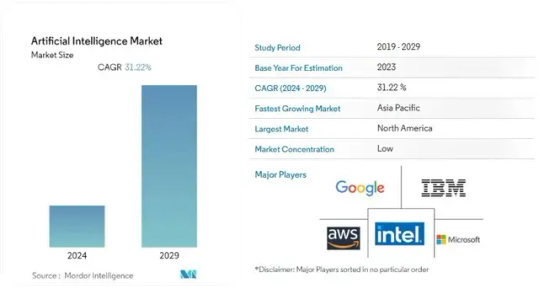
The AI industry is set to skyrocket from USD 2.41 trillion in 2023 to a projected USD 30.13 trillion by 2032, growing at a phenomenal CAGR of 32.4%! The AI market continues to experience robust growth driven by advancements in machine learning, natural language processing, and cloud computing. Key industry player heavily invests in AI to enhance their product offerings and gain competitive advantages.
Here is a brief analysis of why and how AI can transform businesses to stay ahead in the digital age.
Key Trends:
Predictive Analytics: There’s an increasing demand for predictive analytics solutions across various industries to leverage data-driven decision-making.
Data Generation: Massive growth in data generation due to technological advancements is pushing the demand for AI solutions.
Cloud Adoption: The adoption of cloud-based applications and services is accelerating AI implementation.
Consumer Experience: Companies are focusing on enhancing consumer experience through AI-driven personalized services.
Challenges:
Initial Costs: High initial costs and concerns over replacing the human workforce.
Skill Gap: A lack of skilled AI technicians and experts.
Data Privacy: Concerns regarding data privacy and security.
Vabro is excited to announce the launch of Vabro Genie, one of the most intelligent SaaS AI engines. Vabro Genie helps companies manage projects, DevOps, and workflows with unprecedented efficiency and intelligence. Don’t miss out on leveraging this game-changing tool!
Visit www.vabro.com
#ArtificialIntelligence#TechTrends#Innovation#Vabro#AI#VabroGenie#ProjectManagement#DevOps#Workflows#Scrum#Agile
3 notes
·
View notes
Text
DevOps: Balancing the Scales of Advantages and Challenges
In the ever-evolving landscape of technology, the term "DevOps" has become more than just a buzzword; it's a transformative force that's reshaping the way software is developed and delivered. DevOps, a fusion of "development" and "operations," represents a seismic shift in the world of software engineering and IT operations. It's not just a methodology; it's a cultural movement aimed at achieving agility, collaboration, and efficiency in the modern tech ecosystem.
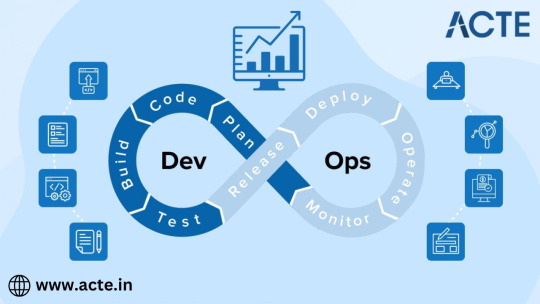
In this comprehensive guide, we'll explore the essential aspects of DevOps, including why it's a necessity in today's technology-driven world. We'll delve into the advantages and disadvantages of DevOps practices and their impact on businesses.
Why DevOps is a Necessity Today
In the fast-paced and dynamic world of technology, businesses can't afford the delays and bottlenecks that traditional software development and deployment processes often entail. DevOps emerges as the solution to this challenge, bridging the gap between the two historically distinct domains of software development and IT operations.
The need for DevOps is driven by several critical factors:
Agility: Modern businesses must respond swiftly to changing customer needs and market trends. DevOps practices empower organizations to deliver software faster and respond more effectively to shifts in the market.
Quality: Customer expectations are at an all-time high. High-quality software with minimal bugs and issues is not just a preference; it's an expectation. DevOps practices, such as continuous integration and continuous delivery (CI/CD), are designed to improve software quality.
Efficiency: The automation of repetitive tasks in the software development and deployment process leads to greater efficiency and reduced manual errors. This automation also cuts operational costs.
Collaboration: DevOps promotes cross-functional collaboration between traditionally siloed development and operations teams. It breaks down communication barriers and fosters a more efficient exchange of ideas and information.
Scalability: The ability to scale infrastructure and applications quickly and efficiently is crucial in a rapidly changing tech landscape. DevOps practices facilitate this scalability.
The Advantages of DevOps
DevOps offers a multitude of benefits, making it a compelling choice for businesses looking to streamline their software development and deployment processes.
Faster Delivery: One of the most significant advantages of DevOps is the acceleration of the development, testing, and deployment of software. This leads to a substantial reduction in time-to-market.
Improved Collaboration: DevOps eliminates the silos that traditionally separated development and operations teams. Enhanced collaboration and communication lead to more efficient workflows and processes.
Enhanced Quality: Continuous integration and continuous delivery practices in DevOps result in higher-quality software with fewer bugs and issues. This directly contributes to greater customer satisfaction.
Efficiency: Automation of repetitive tasks and processes improves efficiency, reduces manual errors, and cuts operational costs. The cost-effectiveness of DevOps is a significant advantage for organizations.
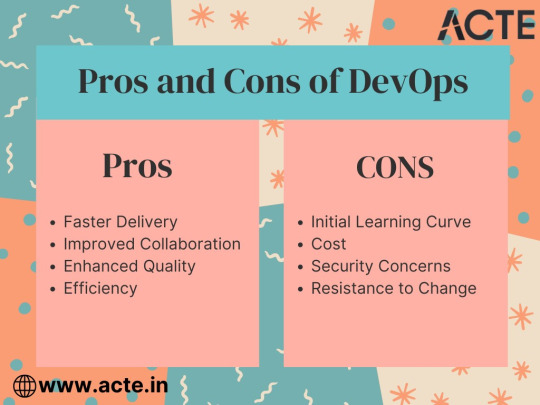
The Disadvantages of DevOps
While the advantages of DevOps are clear and compelling, it's essential to recognize that there are challenges and potential disadvantages associated with its adoption.
Initial Learning Curve: Implementing DevOps practices and tools can be challenging, particularly for teams and individuals who are accustomed to traditional software development and IT operations processes. There is a learning curve associated with the adoption of DevOps practices.
Cost: Setting up and maintaining DevOps practices and tools can be costly, especially for small businesses. The initial investment in infrastructure and training can be a barrier for some organizations.
Security Concerns: DevOps emphasizes speed and automation, which can sometimes come at the expense of security. While security is a fundamental aspect of DevOps, there may be concerns about the potential trade-offs between speed and security. Organizations must place a strong emphasis on security within their DevOps practices.
Resistance to Change: DevOps represents a cultural shift within organizations. Employees may resist changes to traditional ways of working, and there can be resistance to new processes and tools.
In conclusion, DevOps is not just a methodology; it's a necessity in today's tech-driven world. It offers numerous advantages, including faster delivery, improved collaboration, enhanced quality, efficiency, and scalability. While there are challenges associated with its adoption, the benefits of DevOps far outweigh the disadvantages.
If you're considering a career in DevOps, there's no better time to embark on this transformative journey. DevOps professionals are in high demand, and their expertise is instrumental in driving the success of modern businesses. To prepare for a successful career in DevOps, it's crucial to acquire the right skills and knowledge.
This is where ACTE Technologies comes into play. With their comprehensive training programs and expert guidance, you can gain the skills and hands-on experience needed to excel in the field of DevOps. Their courses are tailored to provide you with a deep understanding of DevOps practices, tools, and methodologies. Whether you're starting from scratch or looking to enhance your existing skills, ACTE Technologies is your trusted partner on the path to a rewarding DevOps career. Embrace the DevOps revolution and be at the forefront of software delivery transformation.
12 notes
·
View notes
Text
Top Courses for Aspiring Developers: Elevate Your Skills and Career
Nowadays everyone wants to enhance their skills and career. Everyone wants to improve their skills and take their career forward. You want to improve their skill and take your software development career to the next level.
Today’s tech-driven world, aspiring developers are in high demand. Here’s a guide to some of the top courses designed to elevate your skills and boost your career prospects in the field of software development. Developers use web development languages to help create dynamic web pages. The most common coding languages include Javascript, Python and C. we must constantly update our skills. We should assume good skills that will take our career forward. In this article, we will suggest courses that can help to make software developers.
1. Full-Stack Web Development
This course covers everything from front-end technologies like HTML, CSS, and JavaScript to back-end development with Node.js and Express. It’s ideal for those who want to become proficient in both client and server-side programming.
2. Data Science and Machine Learning
This specialization includes courses on machine learning, data mining, and data analysis. It provides a deep dive into algorithms, statistical methods, and practical applications.
3. Cloud Computing
This course prepares you for the AWS Certified Solutions Architect exam. It covers designing distributed systems, deploying scalable applications, and working with AWS services.
4. Mobile App Development
This series of courses is designed for aspiring iOS developers. It covers Swift programming, user interface design, and app development practices.
5. Cybersecurity
This specialization covers essential cybersecurity concepts, including risk management, cryptography, and network security. It’s designed for those interested in protecting systems and data.
6. Game Development
This specialization covers game design principles, development processes, and interactive media creation. It includes courses on Unity and Unreal Engine, two of the most popular game development platforms.
7. Software Engineering
This course provides a comprehensive overview of software engineering principles, including design patterns, testing, and project management.
8. DevOps
This course introduces key DevOps concepts such as continuous integration, continuous delivery, and infrastructure as code. It’s ideal for developers looking to improve collaboration between development and operations.
By identifying the right courses and doing those courses, we can follow the path of success. As you consider the courses to take, we should do the courses in which we are interest.
Top Courses for Aspiring Developers: Elevate Your Skills and Career
Nowadays everyone wants to enhance their skills and career. Everyone wants to improve their skills and take their career forward. You want to improve their skill and take your software development career to the next level.
Today’s tech-driven world, aspiring developers are in high demand. Here’s a guide to some of the top courses designed to elevate your skills and boost your career prospects in the field of software development. Developers use web development languages to help create dynamic web pages. The most common coding languages include Javascript, Python and C. we must constantly update our skills. We should assume good skills that will take our career forward. In this article, we will suggest courses that can help to make software developers.
1. Full-Stack Web Development
This course covers everything from front-end technologies like HTML, CSS, and JavaScript to back-end development with Node.js and Express. It’s ideal for those who want to become proficient in both client and server-side programming.
2. Data Science and Machine Learning
This specialization includes courses on machine learning, data mining, and data analysis. It provides a deep dive into algorithms, statistical methods, and practical applications.
3. Cloud Computing
This course prepares you for the AWS Certified Solutions Architect exam. It covers designing distributed systems, deploying scalable applications, and working with AWS services.
4. Mobile App Development
This series of courses is designed for aspiring iOS developers. It covers Swift programming, user interface design, and app development practices.
5. Cybersecurity
This specialization covers essential cybersecurity concepts, including risk management, cryptography, and network security. It’s designed for those interested in protecting systems and data.
6. Game Development
This specialization covers game design principles, development processes, and interactive media creation. It includes courses on Unity and Unreal Engine, two of the most popular game development platforms.
7. Software Engineering
This course provides a comprehensive overview of software engineering principles, including design patterns, testing, and project management.
8. DevOps
This course introduces key DevOps concepts such as continuous integration, continuous delivery, and infrastructure as code. It’s ideal for developers looking to improve collaboration between development and operations.
By identifying the right courses and doing those courses, we can follow the path of success. As you consider the courses to take, we should do the courses in which we are interest.
2 notes
·
View notes
Text
Azure DevOps Training
Azure DevOps Training Programs

In today's rapidly evolving tech landscape, mastering Azure DevOps has become indispensable for organizations aiming to streamline their software development and delivery processes. As businesses increasingly migrate their operations to the cloud, the demand for skilled professionals proficient in Azure DevOps continues to soar. In this comprehensive guide, we'll delve into the significance of Azure DevOps training and explore the myriad benefits it offers to both individuals and enterprises.
Understanding Azure DevOps:
Before we delve into the realm of Azure DevOps training, let's first grasp the essence of Azure DevOps itself. Azure DevOps is a robust suite of tools offered by Microsoft Azure that facilitates collaboration, automation, and orchestration across the entire software development lifecycle. From planning and coding to building, testing, and deployment, Azure DevOps provides a unified platform for managing and executing diverse DevOps tasks seamlessly.
Why Azure DevOps Training Matters:
With Azure DevOps emerging as the cornerstone of modern DevOps practices, acquiring proficiency in this domain has become imperative for IT professionals seeking to stay ahead of the curve. Azure DevOps training equips individuals with the knowledge and skills necessary to leverage Microsoft Azure's suite of tools effectively. Whether you're a developer, IT administrator, or project manager, undergoing Azure DevOps training can significantly enhance your career prospects and empower you to drive innovation within your organization.
Key Components of Azure DevOps Training Programs:
Azure DevOps training programs are meticulously designed to cover a wide array of topics essential for mastering the intricacies of Azure DevOps. From basic concepts to advanced techniques, these programs encompass the following key components:
Azure DevOps Fundamentals: An in-depth introduction to Azure DevOps, including its core features, functionalities, and architecture.
Agile Methodologies: Understanding Agile principles and practices, and how they align with Azure DevOps for efficient project management and delivery.
Continuous Integration (CI): Learning to automate the process of integrating code changes into a shared repository, thereby enabling early detection of defects and ensuring software quality.
Continuous Deployment (CD): Exploring the principles of continuous deployment and mastering techniques for automating the deployment of applications to production environments.
Azure Pipelines: Harnessing the power of Azure Pipelines for building, testing, and deploying code across diverse platforms and environments.
Infrastructure as Code (IaC): Leveraging Infrastructure as Code principles to automate the provisioning and management of cloud resources using tools like Azure Resource Manager (ARM) templates.
Monitoring and Logging: Implementing robust monitoring and logging solutions to gain insights into application performance and troubleshoot issues effectively.
Security and Compliance: Understanding best practices for ensuring the security and compliance of Azure DevOps environments, including identity and access management, data protection, and regulatory compliance.
The Benefits of Azure DevOps Certification:
Obtaining Azure DevOps certification not only validates your expertise in Azure DevOps but also serves as a testament to your commitment to continuous learning and professional development. Azure DevOps certifications offered by Microsoft Azure are recognized globally and can open doors to exciting career opportunities in various domains, including cloud computing, software development, and DevOps engineering.
Conclusion:
In conclusion, Azure DevOps training is indispensable for IT professionals looking to enhance their skills and stay relevant in today's dynamic tech landscape. By undergoing comprehensive Azure DevOps training programs and obtaining relevant certifications, individuals can unlock a world of opportunities and propel their careers to new heights. Whether you're aiming to streamline your organization's software delivery processes or embark on a rewarding career journey, mastering Azure DevOps is undoubtedly a game-changer. So why wait? Start your Azure DevOps training journey today and pave the way for a brighter tomorrow.
5 notes
·
View notes
Text
From Novice to Pro: Master the Cloud with AWS Training!
In today's rapidly evolving technology landscape, cloud computing has emerged as a game-changer, providing businesses with unparalleled flexibility, scalability, and cost-efficiency. Among the various cloud platforms available, Amazon Web Services (AWS) stands out as a leader, offering a comprehensive suite of services and solutions. Whether you are a fresh graduate eager to kickstart your career or a seasoned professional looking to upskill, AWS training can be the gateway to success in the cloud. This article explores the key components of AWS training, the reasons why it is a compelling choice, the promising placement opportunities it brings, and the numerous benefits it offers.

Key Components of AWS Training
1. Foundational Knowledge: Building a Strong Base
AWS training starts by laying a solid foundation of cloud computing concepts and AWS-specific terminology. It covers essential topics such as virtualization, storage types, networking, and security fundamentals. This groundwork ensures that even individuals with little to no prior knowledge of cloud computing can grasp the intricacies of AWS technology easily.
2. Core Services: Exploring the AWS Portfolio
Once the fundamentals are in place, AWS training delves into the vast array of core services offered by the platform. Participants learn about compute services like Amazon Elastic Compute Cloud (EC2), storage options such as Amazon Simple Storage Service (S3), and database solutions like Amazon Relational Database Service (RDS). Additionally, they gain insights into services that enhance performance, scalability, and security, such as Amazon Virtual Private Cloud (VPC), AWS Identity and Access Management (IAM), and AWS CloudTrail.
3. Specialized Domains: Nurturing Expertise
As participants progress through the training, they have the opportunity to explore advanced and specialized areas within AWS. These can include topics like machine learning, big data analytics, Internet of Things (IoT), serverless computing, and DevOps practices. By delving into these niches, individuals can gain expertise in specific domains and position themselves as sought-after professionals in the industry.

Reasons to Choose AWS Training
1. Industry Dominance: Aligning with the Market Leader
One of the significant reasons to choose AWS training is the platform's unrivaled market dominance. With a staggering market share, AWS is trusted and adopted by businesses across industries worldwide. By acquiring AWS skills, individuals become part of the ecosystem that powers the digital transformation of numerous organizations, enhancing their career prospects significantly.
2. Comprehensive Learning Resources: Abundance of Educational Tools
AWS training offers a wealth of comprehensive learning resources, ranging from extensive documentation, tutorials, and whitepapers to hands-on labs and interactive courses. These resources cater to different learning preferences, enabling individuals to choose their preferred mode of learning and acquire a deep understanding of AWS services and concepts.
3. Recognized Certifications: Validating Expertise
AWS certifications are globally recognized credentials that validate an individual's competence in using AWS services and solutions effectively. By completing AWS training and obtaining certifications like AWS Certified Solutions Architect or AWS Certified Developer, individuals can boost their professional credibility, open doors to new job opportunities, and command higher salaries in the job market.
Placement Opportunities
Upon completing AWS training, individuals can explore a multitude of placement opportunities. The demand for professionals skilled in AWS is soaring, as organizations increasingly migrate their infrastructure to the cloud or adopt hybrid cloud strategies. From startups to multinational corporations, industries spanning finance, healthcare, retail, and more seek talented individuals who can architect, develop, and manage cloud-based solutions using AWS. This robust demand translates into a plethora of rewarding career options and a higher likelihood of finding positions that align with one's interests and aspirations.

In conclusion, mastering the cloud with AWS training at ACTE institute provides individuals with a solid foundation, comprehensive knowledge, and specialized expertise in one of the most dominant cloud platforms available. The reasons to choose AWS training are compelling, ranging from the industry's unparalleled market position to the top ranking state.
9 notes
·
View notes
Text
Navigating the Dynamic Horizons of DevOps Careers: A Comprehensive Exploration
In the ever-evolving IT landscape, the rise of DevOps has reshaped how organizations approach software development and operations, presenting a realm of opportunities for aspiring professionals. This in-depth exploration unveils the multifaceted dimensions that define DevOps careers, shedding light on the dynamic nature and promising prospects within this thriving field.

1. The DevOps Surge: Meeting the Demand for Proficient Practitioners
Embarking on a DevOps career is driven by the enticing demand for professionals adept in collaborative practices and automation. Organizations spanning diverse industries recognize DevOps as a catalyst for streamlined workflows, heightened collaboration, and accelerated, reliable software delivery.
2. Lifelong Learning in DevOps: A Journey of Continuous Evolution
At the heart of DevOps lies a commitment to continuous learning, reflecting the discipline's dynamic nature. DevOps professionals navigate an ever-evolving landscape, staying ahead of industry trends, and adapting their skill set to remain not just relevant but impactful contributors to their organizational success.
3. Versatility: Bridging the Gap Between Development and Operations
Versatility defines the core competency of DevOps professionals who serve as pivotal bridges between development and operations teams. Their unique ability to comprehend the entire software development lifecycle enhances effective communication and collaboration across diverse functional domains.
4. Boosting Efficiency: DevOps Impact on Productivity and Beyond
DevOps practices, centered on automation and collaboration, lead to enhanced efficiency and productivity within development and operations processes. The integration of continuous integration and continuous deployment (CI/CD) pipelines becomes a transformative force, catalyzing positive change within organizational structures.
5. Competitive Rewards: Recognizing DevOps' Strategic Significance
The strategic significance of DevOps manifests in competitive salaries for professionals in the field. Organizations acknowledge the specialized skill set possessed by DevOps practitioners, valuing their role in optimizing software delivery and contributing to overall competitiveness.

6. Global Reach: Beyond Geographical Constraints in DevOps Careers
DevOps transcends geographical boundaries, offering professionals the opportunity to engage with diverse teams worldwide. The rise of remote work and global collaboration enriches professional experiences, opening avenues for learning and networking on a truly international scale.
7. Job Satisfaction: Nurturing Positivity Through Collaborative Efforts
The collaborative ethos of DevOps creates a positive work environment, fostering job satisfaction among practitioners. Contributions to shared goals in software development and IT operational efficiency become sources of fulfillment, elevating the overall professional experience.
8. Progressing in DevOps: Navigating a Diverse Career Landscape
DevOps presents a spectrum of career progression paths catering to individuals at various expertise levels. From entry-level positions like Junior DevOps Engineer to more advanced roles such as DevOps Architect or DevOps Manager, the field offers diverse opportunities for career advancement. The cross-disciplinary nature of DevOps allows professionals to explore different facets of IT and software development, cultivating a well-rounded skill set for future roles.
9. Fueling Innovation: Cultivating Creativity in the DevOps Culture
Innovation takes center stage in the DevOps culture, with professionals actively embracing experimentation and cutting-edge technologies. Positioned at the forefront of technological advancements, DevOps practitioners contribute to the development and adoption of new tools and practices, injecting excitement and challenge into their work.
10. Job Security: Flourishing in DevOps' Growing Landscape
As organizations increasingly acknowledge the benefits of DevOps practices, the demand for skilled professionals continues to rise, ensuring job security for DevOps practitioners. This sustained demand positions DevOps as a resilient and promising career choice, with organizations investing to stay competitive and innovative in the market.
In Conclusion: DevOps as a Career Odyssey
Beyond being a mere career choice, DevOps unfolds as a transformative odyssey, promising a fulfilling journey with myriad advantages. From its high demand and continuous learning opportunities to versatile skills, competitive rewards, and a global perspective, DevOps paints a dynamic and enriching career path. For those drawn to collaboration, problem-solving, and the convergence of development and operations, a DevOps career beckons as an exhilarating voyage. Embrace this journey, commit to continuous growth, and position yourself for success in the ever-evolving landscape of DevOps. Wishing you the best in your career exploration!
2 notes
·
View notes
Text
Crafting a Career Odyssey: AWS Certification Unveiled for Solution Architects
Embarking on the journey of AWS certification as a Solution Architect unveils a plethora of career avenues, transforming your professional trajectory in the dynamic landscape of cloud computing. Let's explore the myriad paths that unfold for certified AWS Solution Architects:
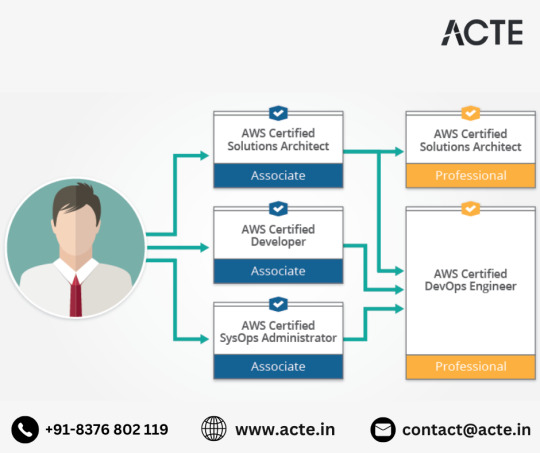
1. Architecting Excellence: Steering Digital Transformations AWS certification catapults you into roles where you architect and implement cutting-edge solutions. As a linchpin in digital transformations, you play a pivotal role in creating scalable, secure, and cost-effective solutions aligned with organizational objectives.
2. Cloud Architect Mastery: Orchestrating Comprehensive Cloud Strategies The journey doesn't stop at Solution Architect; it seamlessly transitions into broader Cloud Architect roles. Here, you orchestrate end-to-end cloud strategies, ensuring optimal performance, security, and efficiency in cloud-based environments.
3. Enterprise Architect Pinnacle: Shaping Holistic IT Strategies With AWS certification, the pathway extends to Enterprise Architect roles. This involves shaping the overarching IT strategy, aligning technology solutions with business goals, and ensuring seamless integration across the enterprise.
4. Cloud Consulting Expertise: Guiding Clients on Cloud Journey Organizations seek AWS-certified Solution Architects for Cloud Consultant positions, where you provide guidance on cloud strategies, migration plans, and optimize AWS infrastructure for enhanced performance.
5. Technical Leadership Zenith: Guiding Development Initiatives Expertise gained through AWS certification positions you favorably for technical leadership roles. Leading teams, guiding development projects, and offering strategic input on technology initiatives become part of your purview.
6. DevOps Alchemy: Bridging Development and Operations The fusion of AWS expertise and Solution Architect skills opens doors to DevOps Engineer opportunities. Your grasp of cloud infrastructure proves invaluable in optimizing continuous integration and deployment pipelines.
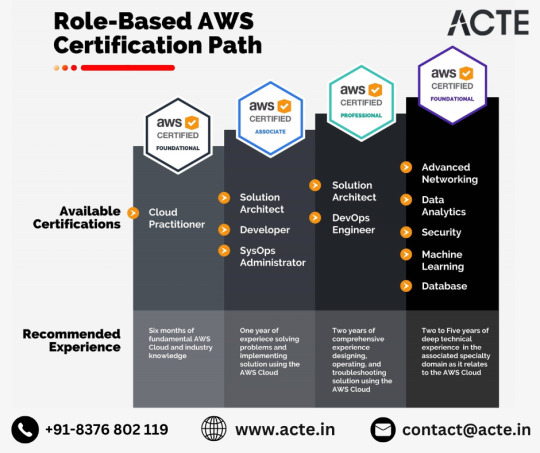
7. Pre-Sales Artistry: Crafting Compelling Solutions Leverage AWS certification in Pre-Sales Solutions Architect positions. Engaging with clients during the pre-sales phase, you become instrumental in understanding their needs and crafting compelling solutions.
8. Specialized Architectural Prowess: Exploring Niche Opportunities As technology evolves, specialized Solution Architect roles emerge. Depending on your interests and the evolving AWS service landscape, opportunities in areas like AI/ML architecture, IoT solutions, or serverless architectures beckon.
9. Entrepreneurial Odyssey: Beyond Conventional Paths Armed with AWS certification, entrepreneurial pursuits become viable. Whether offering specialized AWS services or launching a tech startup, the certification serves as a foundation for innovative endeavors.
10. Lifelong Learning Odyssey: Staying Ahead in the Dynamic AWS Realm The AWS ecosystem is dynamic, with constant updates and new services. Your certification journey becomes a springboard for continuous learning and professional development, ensuring you remain at the forefront of cloud technology.
In conclusion, AWS certification for Solution Architects is not just a validation; it's a compass guiding you through a rich tapestry of career possibilities. Whether crafting digital landscapes, steering enterprises through the cloud, or exploring niche opportunities, the certification becomes a catalyst for continuous growth, learning, and innovation in the ever-evolving cloud computing domain.
2 notes
·
View notes
Text
Navigating the Future as Azure Certifications in 2024
In the ever-evolving landscape of cloud technology, Azure certifications continue to be instrumental in shaping the careers of IT professionals and influencing the strategies of organizations worldwide. As we step into 2024, it's essential to explore the current trends, advancements, and the transformative impact that Azure certifications are poised to have in the coming year.
The Continued Relevance of Azure Certifications
Azure certifications are not mere credentials; they are gateways to expertise and recognition in the dynamic world of cloud computing. As businesses increasingly rely on cloud solutions, the demand for skilled Azure professionals continues to grow. In 2024, Azure certifications stand as key assets, ensuring that professionals possess the knowledge and skills needed to navigate the complexities of cloud technology effectively.
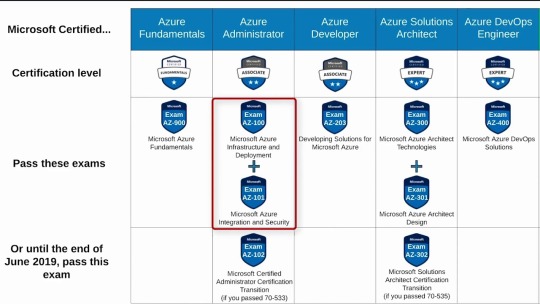
Azure Certification Paths in 2024
Azure certifications are structured into comprehensive paths, catering to individuals at various stages of their cloud journey. From foundational certifications for beginners to advanced tracks tailored for specialized roles like Azure Solutions Architect or Azure DevOps Engineer, the certification paths have evolved to align with the diverse needs of IT professionals. The year 2024 sees an increased focus on role-based certifications, allowing individuals to hone specific skills relevant to their job roles.
Key Benefits of Azure Certifications in 2024
Career Advancement:
Azure certifications are a proven catalyst for career growth. In 2024, as businesses seek skilled professionals, holding an Azure certification becomes a valuable asset for those aiming to advance their careers in cloud technology.
Industry Recognition:
Globally recognized, Azure certifications validate one's expertise in Microsoft's cloud services. Employers across industries acknowledge and value these certifications as a mark of proficiency in handling Azure-based solutions.
Continuous Learning Culture:
In 2024, Azure certifications are not just about achieving a one-time qualification; they embody a commitment to continuous learning. Microsoft regularly updates its certification paths to align with emerging technologies, encouraging professionals to stay abreast of the latest industry trends.
Increased Employability:
As the job market becomes more competitive, possessing Azure certifications enhances employability. In 2024, businesses are actively seeking candidates with practical Azure skills, making certification holders highly sought after.
Emerging Trends in Azure Certifications for 2024
Micro-Certifications:
2024 witnesses a rise in micro-certifications, focusing on specific, targeted skills. These bite-sized certifications allow professionals to demonstrate expertise in niche areas, providing a more granular approach to skill validation.
Scenario-Based Assessments:
Azure certification exams in 2024 are increasingly incorporating scenario-based questions. This shift aims to evaluate not just theoretical knowledge but the ability to apply that knowledge in practical, real-world situations.
Integration of AI and ML:
With the growing importance of artificial intelligence (AI) and machine learning (ML), Azure certifications in 2024 are placing a greater emphasis on these technologies. Certification tracks dedicated to AI and ML applications within Azure are gaining prominence.
Focus on Security:
In response to the heightened concern for cybersecurity, Azure certifications in 2024 place a significant focus on security-related tracks. Azure Security Engineer certifications are expected to be in high demand as organizations prioritize securing their cloud environments.
Tips for Success in Azure Certifications 2024
Stay Updated: Given the evolving nature of technology, staying updated with the latest Azure services and features is crucial. Regularly check Microsoft's official documentation and announcements for any updates.
Hands-On Experience: Practical experience is invaluable. Utilize Azure's sandbox environments, participate in real-world projects, and engage with the Azure portal to reinforce your theoretical knowledge.
Leverage Learning Resources: Microsoft provides a wealth of learning resources, including online courses, documentation, and practice exams. Take advantage of these resources to supplement your preparation.
Join the Azure Community: Engage with the Azure community through forums, webinars, and social media. Networking with professionals in the field can provide insights, tips, and support during your certification journey.
Conclusion
As we venture into 2024, Azure certifications stand as pivotal tools for IT professionals aiming to thrive in the dynamic world of cloud technology. Whether you are starting your journey with foundational certifications or advancing your skills with specialized tracks, Azure certifications in 2024 represent more than just qualifications – they symbolize a commitment to excellence, continuous learning, and a future shaped by innovation in the cloud. Embrace the opportunities, stay ahead of the curve, and let Azure certifications be your guide to success in the ever-evolving realm of cloud proficiency.

Frequently Asked Questions (FAQs)
What are the new Azure certifications introduced in 2024?
As of 2024, Microsoft has introduced several new certifications to align with emerging technologies. Notable additions include specialized tracks focusing on AI, ML, and advanced security.
How has the exam format changed for 2024?
The exam format in 2024 has evolved to include more scenario-based questions. This change is aimed at assessing practical application skills in addition to theoretical knowledge.
Are there any prerequisites for Azure certifications in 2024?
Prerequisites vary based on the specific certification. While some foundational certifications may have no prerequisites, advanced certifications often require prior experience or the completion of specific lower-level certifications.
Can I still take exams for older Azure certifications in 2024?
Microsoft often provides a transition period for older certifications, allowing candidates to complete them even as new certifications are introduced. However, it's advisable to check Microsoft's official documentation for specific details.
How frequently are Azure certifications updated?
Azure certifications are regularly updated to stay aligned with the latest technologies and industry trends. Microsoft recommends that candidates stay informed about updates through official communication channels.
4 notes
·
View notes
Text
Unveiling the Wonders of DevOps: Exploring Benefits and Challenges in Simple Language
Hello tech enthusiasts! If you've ever been curious about DevOps and desire a clear breakdown of its advantages and drawbacks, you're in for a treat. Let's dive into the marvels and obstacles of DevOps using plain and simple language from The Best Devops Training Institute in Bangalore.

The Upsides: Embracing the Magic of DevOps
1. Swift Software Delivery:
The Marvel: DevOps functions like a magician's wand, hastening the pace of software development and delivery. Updates and features roll out faster, ensuring you stay agile in the ever-evolving tech landscape. I will highly recommend the best Devops Course in Bangalore.
Why It's Fantastic: Quick updates keep you relevant and adaptable in a fast-paced digital world.
2. Team Collaboration Triumphs:
The Marvel: In the DevOps universe, developers and operations teams become dynamic partners. No more working in isolation; they team up to eliminate obstacles and ensure a seamless flow of creativity and technical expertise.
Why It's Fantastic: Team synergy fosters innovation, leading to more robust and inventive software.
3. Reduced Glitches, Enhanced Stability:
The Marvel: Similar to a flawless spell, DevOps minimizes software glitches. It's a time-saver, making your software more dependable.
Why It's Fantastic: Spending less time troubleshooting issues means more time for creating exceptional software.
4. Automation Magic:
The Marvel: Just like a magical incantation, mundane tasks can be automated with DevOps. This translates to less time devoted to routine chores and more time for imaginative and impactful work.
Why It's Fantastic: Automation liberates you from the shackles of repetitive tasks, unleashing your creative potential.
5. Continuous Feedback Loop:
The Marvel: DevOps comes with a built-in oracle, offering insights into how changes impact the software. This continuous learning loop facilitates ongoing improvements.
Why It's Fantastic: Learning from every step ensures a software evolution that continually enhances.
6. Innovation Boost:
The Marvel: DevOps doesn't just deliver software; it fosters a culture of continuous improvement and innovation. Your software stays ahead with the latest and most exciting features.
Why It's Fantastic: Embracing innovation keeps your software at the forefront of the industry.
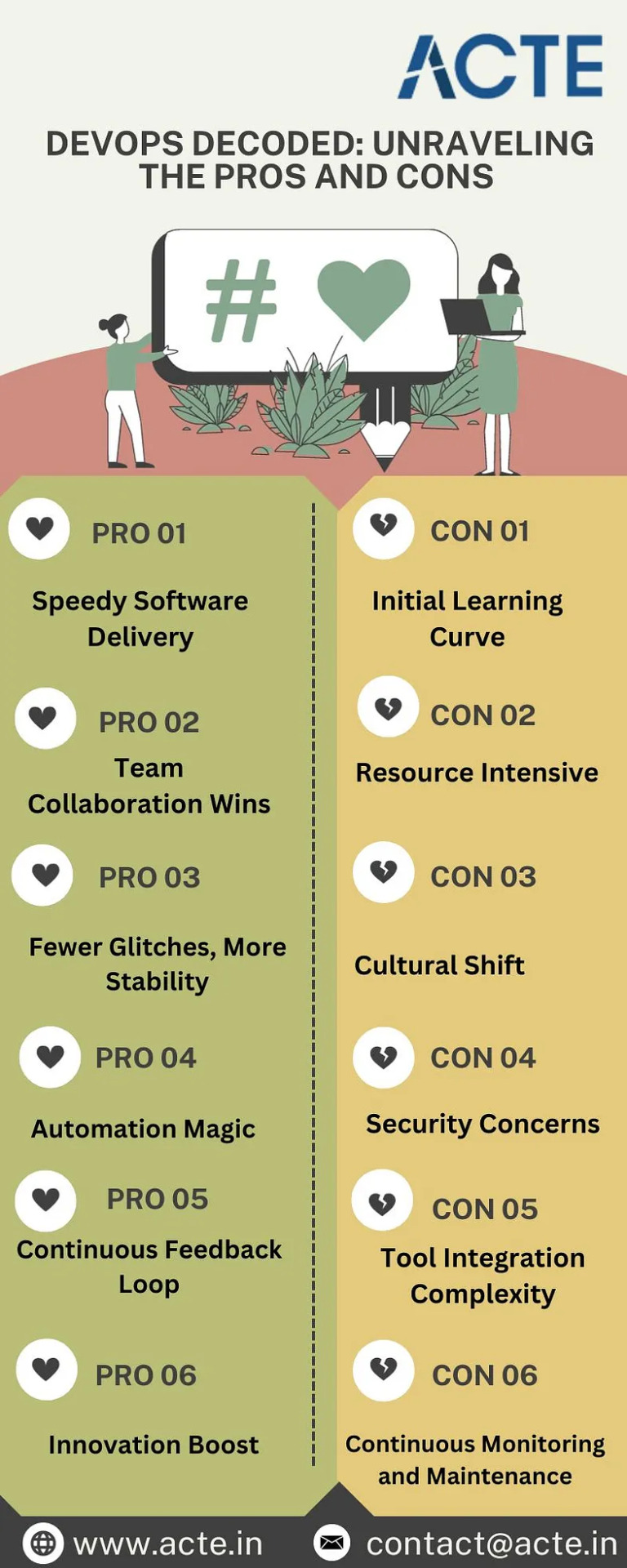
The Downsides: Navigating the Challenges of DevOps
1. Initial Learning Curve:
The Challenge: Implementing DevOps demands a shift in mindset and practices, leading to an initially steep learning curve.
Navigating It: Invest time in training and ensure everyone is on board to ease into the new DevOps culture.
2. Resource Intensive:
The Challenge: Adopting DevOps can require significant resources, from tools to skilled personnel.
Navigating It: Plan the transition carefully, allocate resources wisely, and consider gradual implementation.
3. Cultural Shift:
The Challenge: DevOps isn't just about tools; it's a cultural shift. Resistance to change can pose a stumbling block.
Navigating It: Communicate the benefits, involve the team in decision-making, and cultivate a collaborative culture.
4. Security Concerns:
The Challenge: The speed of DevOps can raise concerns about security lapses.
Navigating It: Integrate security measures into the DevOps pipeline and prioritize continuous security testing.
5. Tool Integration Complexity:
The Challenge: Integrating different tools in the DevOps toolchain can be complex.
Navigating It: Choose tools wisely, ensure compatibility, and provide training for seamless integration.
6. Continuous Monitoring and Maintenance:
The Challenge: DevOps requires continuous monitoring and maintenance, adding an ongoing responsibility.
Navigating It: Establish robust monitoring practices and allocate resources for ongoing maintenance.
Conclusion: Navigating the DevOps Journey
In the captivating realm of DevOps, the advantages are enchanting, offering speed, collaboration, and innovation. However, like any journey, challenges are present. The key lies in understanding and addressing these challenges, embracing the cultural shift, and crafting a DevOps strategy aligned with your team's goals. So, gear up, embrace the magic, and embark on a DevOps journey that transforms the way you create and deliver software!
2 notes
·
View notes
Text
Azure’s Evolution: What Every IT Pro Should Know About Microsoft’s Cloud
IT professionals need to keep ahead of the curve in the ever changing world of technology today. The cloud has become an integral part of modern IT infrastructure, and one of the leading players in this domain is Microsoft Azure. Azure’s evolution over the years has been nothing short of remarkable, making it essential for IT pros to understand its journey and keep pace with its innovations. In this blog, we’ll take you on a journey through Azure’s transformation, exploring its history, service portfolio, global reach, security measures, and much more. By the end of this article, you’ll have a comprehensive understanding of what every IT pro should know about Microsoft’s cloud platform.
Historical Overview
Azure’s Humble Beginnings
Microsoft Azure was officially launched in February 2010 as “Windows Azure.” It began as a platform-as-a-service (PaaS) offering primarily focused on providing Windows-based cloud services.
The Azure Branding Shift
In 2014, Microsoft rebranded Windows Azure to Microsoft Azure to reflect its broader support for various operating systems, programming languages, and frameworks. This rebranding marked a significant shift in Azure’s identity and capabilities.
Key Milestones
Over the years, Azure has achieved numerous milestones, including the introduction of Azure Virtual Machines, Azure App Service, and the Azure Marketplace. These milestones have expanded its capabilities and made it a go-to choice for businesses of all sizes.
Expanding Service Portfolio
Azure’s service portfolio has grown exponentially since its inception. Today, it offers a vast array of services catering to diverse needs:
Compute Services: Azure provides a range of options, from virtual machines (VMs) to serverless computing with Azure Functions.
Data Services: Azure offers data storage solutions like Azure SQL Database, Cosmos DB, and Azure Data Lake Storage.
AI and Machine Learning: With Azure Machine Learning and Cognitive Services, IT pros can harness the power of AI for their applications.
IoT Solutions: Azure IoT Hub and IoT Central simplify the development and management of IoT solutions.
Azure Regions and Global Reach
Azure boasts an extensive network of data centers spread across the globe. This global presence offers several advantages:
Scalability: IT pros can easily scale their applications by deploying resources in multiple regions.
Redundancy: Azure’s global datacenter presence ensures high availability and data redundancy.
Data Sovereignty: Choosing the right Azure region is crucial for data compliance and sovereignty.
Integration and Hybrid Solutions
Azure’s integration capabilities are a boon for businesses with hybrid cloud needs. Azure Arc, for instance, allows you to manage on-premises, multi-cloud, and edge environments through a unified interface. Azure’s compatibility with other cloud providers simplifies multi-cloud management.
Security and Compliance
Azure has made significant strides in security and compliance. It offers features like Azure Security Center, Azure Active Directory, and extensive compliance certifications. IT pros can leverage these tools to meet stringent security and regulatory requirements.
Azure Marketplace and Third-Party Offerings
Azure Marketplace is a treasure trove of third-party solutions that complement Azure services. IT pros can explore a wide range of offerings, from monitoring tools to cybersecurity solutions, to enhance their Azure deployments.
Azure DevOps and Automation
Automation is key to efficiently managing Azure resources. Azure DevOps services and tools facilitate continuous integration and continuous delivery (CI/CD), ensuring faster and more reliable application deployments.

Monitoring and Management
Azure offers robust monitoring and management tools to help IT pros optimize resource usage, troubleshoot issues, and gain insights into their Azure deployments. Best practices for resource management can help reduce costs and improve performance.
Future Trends and Innovations
As the technology landscape continues to evolve, Azure remains at the forefront of innovation. Keep an eye on trends like edge computing and quantum computing, as Azure is likely to play a significant role in these domains.
Training and Certification
To excel in your IT career, consider pursuing Azure certifications. ACTE Institute offers a range of certifications, such as the Microsoft Azure course to validate your expertise in Azure technologies.

In conclusion, Azure’s evolution is a testament to Microsoft’s commitment to cloud innovation. As an IT professional, understanding Azure’s history, service offerings, global reach, security measures, and future trends is paramount. Azure’s versatility and comprehensive toolset make it a top choice for organizations worldwide. By staying informed and adapting to Azure’s evolving landscape, IT pros can remain at the forefront of cloud technology, delivering value to their organizations and clients in an ever-changing digital world. Embrace Azure’s evolution, and empower yourself for a successful future in the cloud.
#microsoft azure#tech#education#cloud services#azure devops#information technology#automation#innovation
2 notes
·
View notes